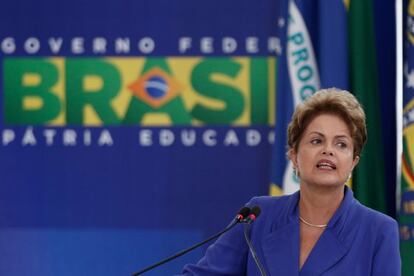Brazil’s political crisis deepens as education chief forced to resign
Minister clashes with Rousseff's allies in Congress after labeling them “extortionists”

The ongoing political crisis in Brazil reached new heights on Wednesday when President Dilma Rousseff’s education minister suddenly resigned after a quarrel with members of the government’s major coalition partner in Congress.
The Brazilian Democratic Movement Party (PMDB) demanded the firing of education chief Cid Gomes over remarks he made last week in which he described opposition party members as “extortionists” for seeking more government posts and pork barrel funding.
After an angry session, which saw Gomes walk out after he refused to retract his statements, the president summoned him to her office. It was later announced that he was stepping down.
Gomes walked out of Congress after he refused to retract his statements calling the PMDB “extortionists”
The first Cabinet resignation to take place in Rousseff’s second term has come at a crucial time, as the president struggles to boost her plunging approval ratings and raise public support for unpopular economic austerity policies, which include tax and utility hikes and lower public spending.
She is also trying to contain the growing Petrobras corruption investigation, which has engulfed members of her Workers Party (PT) and the speakers of both congressional chambers, who are members of the PMDB.
Just over three months into her second term, 62 percent of Brazilians rated her administration as “bad” or “very bad” in a recent poll conducted by Datafolha, the surveying firm run by the daily Folha de São Paulo.
On the same day Gomes resigned, Rousseff announced a series of measures to eradicate corruption and called for a national pact to deal with the problem.
“We are a government that does not tolerate corruption,” she said.
Rousseff has been affected by Sunday’s massive anti-government protests held in São Paulo, Rio de Janeiro and other major cities, where at a least one million people took part. Many citizens were calling for her impeachment.
But the possibility of forcing her out of office appears remote. Chamber of Deputies Speaker Eduardo Cunha, who has been targeted in the Petrobras inquiry, has said on various occasions that he doesn’t see any legal or political reason to initiate an impeachment process.
Still, some opposition parties in Congress, including her former presidential campaign rival, Senator Aécio Neves, who is also president of the Brazilian Social Democracy Party (PSDB), asked the Supreme Court to look into the possibility of investigating Rousseff in the Petrobras case.
Rousseff, who denies being aware of any kickbacks or bribery schemes at the state oil company, served on the board of directors at Petrobras at the time prosecutors allege the multi-million illegal transactions were taking place.
More than 45 government and party officials, as well as a number of businessmen, are being investigated for allegedly profiting from overpriced oil and supply contracts that were authorized through kickbacks and scheming.
Some opposition members have asked the Supreme Court to investigate Rousseff in the Petrobras case
“My commitment to fight corruption is coherent with my personal life and my political will,” Rousseff said on Wednesday, adding that Brazilians “know that corruption wasn’t invented just recently.”
Among the measures Rousseff will introduce are new laws that would make it a felony for political parties to hide campaign money, something that is currently listed as a misdemeanor on the law books.
“This will satisfy the public, which has been demanding more transparent and cleaner elections,” she said.
The government also proposed new ethical regulations that will ban civil servants from running for office if they have been convicted of campaign election crimes; investigate the finances of all public employees who cannot justify property or bank accounts in their name; and speed up forfeitures of property and goods of those convicted of corruption.
Rousseff also wants to toughen penalties for businessmen who form part of bribery schemes.
According to Brazilian press reports, investigators in Switzerland froze some $400 million in accounts tied to the Petrobras scandal. Swiss authorities have already returned around $120 million.
Tu suscripción se está usando en otro dispositivo
¿Quieres añadir otro usuario a tu suscripción?
Si continúas leyendo en este dispositivo, no se podrá leer en el otro.
FlechaTu suscripción se está usando en otro dispositivo y solo puedes acceder a EL PAÍS desde un dispositivo a la vez.
Si quieres compartir tu cuenta, cambia tu suscripción a la modalidad Premium, así podrás añadir otro usuario. Cada uno accederá con su propia cuenta de email, lo que os permitirá personalizar vuestra experiencia en EL PAÍS.
¿Tienes una suscripción de empresa? Accede aquí para contratar más cuentas.
En el caso de no saber quién está usando tu cuenta, te recomendamos cambiar tu contraseña aquí.
Si decides continuar compartiendo tu cuenta, este mensaje se mostrará en tu dispositivo y en el de la otra persona que está usando tu cuenta de forma indefinida, afectando a tu experiencia de lectura. Puedes consultar aquí los términos y condiciones de la suscripción digital.









































